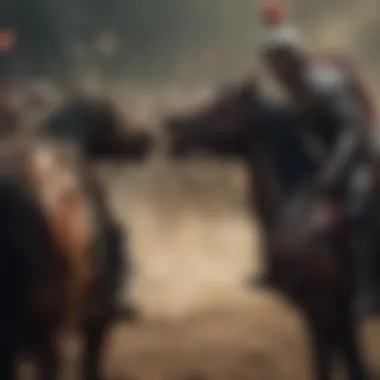Exploring Power Dynamics of Lords and Kings in Game of Thrones


Intro
In the chaotic world of Game of Thrones, the dynamics between lords and kings serve as a relentless backdrop to the rich tapestry of political maneuverings. Much like a game of chess, each move made by figures of authority ripples outward, affecting not just their immediate surroundings but the very fate of Westeros. As we venture into these royal narratives, it's crucial to grasp the underlying motivations driving these characters, be it loyalty, ambition, or mere survival.
This exploration will dissect notable figures who wield power over the Iron Throne, revealing the complex motivations that fuel their decisions. The play of destiny intertwined with betrayal and ambition paints a mural of life in Westeros that is both intricate and brutal.
Character Dissections
Key Figures in the Game
When we think of the game for power, names like Eddard Stark, Cersei Lannister, and Robb Stark leap to mind. Each character embodies unique traits that influence their subjects and alter political landscapes:
- Eddard Stark: The epitome of honor in a realm where deceit reigns. His unwavering sense of justice often leads him to make choices that are not only morally sound but politically naive. His death serves as a stark reminder that nobility can lead to downfall.
- Cersei Lannister: A master of manipulation, Cersei showcases the darker side of ambition. Her relentless pursuit of power illustrates how love, jealousy, and vengeance intertwine as she uses those closest to her to achieve her ends, often disregarding the collateral damage left in her wake.
- Robb Stark: Early in the series, Robb rises as a strong leader with all the qualities of his father. However, his youthful impetuosity in matters of loyalty and honor ultimately leads to his tragic fate. His arc serves to underline the perils of leadership without a keen understanding of the full political landscape.
Development Over Seasons
Character development is not merely an embellishment; it is the lifeblood of the series. Take Jaime Lannister, for example. Once seen as a self-absorbed knight, over the seasons, he grapples with his identity, revealing layers of guilt and honor that redefine his role.
- First Season: Regarded as the 'Kingslayer,' Jaime is vilified for killing King Aerys II, yet the rationale behind his actions is buried under layers of misunderstanding.
- Later Seasons: As he engages in a complex relationship with Brienne of Tarth, viewers see a man caught between his past and the idea of redemption, showcasing how relationships can shift personal allegiances.
This evolution in character adds depth to the political veracity in Game of Thrones, making the audience ponder not only the motives behind actions but the growth – or decline – of these power-holders.
Broader Impacts on the Storyline
The fusion of these character arcs is pivotal to the overarching storyline. Their decisions, governed by both personal desires and the unforgiving world around them, create a domino effect that elevates the stakes for everyone.
"Chaos isn’t a pit. Chaos is a ladder."
This quote by Petyr Baelish encapsulates how ambition and opportunism play out among the nobility. As lords and kings shift allegiances, the audience witnesses a fluctuating balance of power.
In analyzing these characters, we not only document their journeys but also capture the essence of what it means to navigate the torrid waters of ambition, allegiance, and authority in Game of Thrones.
Next, we will delve into pivotal episodes, exploring key events that define the power plays among these figures.
Preface to the Concept of Kingship
In the realm of Game of Thrones, kingship is not merely a title; it’s a profound and often perilous responsibility. This concept serves as the backbone of the intricate narratives that unfold within Westeros. Understanding kingship enhances one’s appreciation of the characters and conflicts that drive the series. The stakes are constantly high, and the implications of one’s actions can reverberate beyond personal ambition, affecting entire kingdoms.
Kings, lords, and the relationships between them create a web of alliances, feuds, and power dynamics that paint the landscape of this fictional world. From the ancestral halls of the Starks in Winterfell to the bloody courts of King's Landing, every decision made by those in power has the potential to shake the very foundations of their realm.
Defining Kingship in Westeros
Kingship in Westeros is grounded in a mixture of lineage, divine right, and the will of the people. Unlike traditional monarchies where kings may rule unchallenged, rulers in this universe often find their claim to the throne questioned. For example, Robert Baratheon’s claim was rooted in his successful rebellion against the Targaryen dynasty. His rule highlights the tension between might and right, suggesting that a crown might rest on a head not born to wear it.
One may also consider the symbolic aspects of kingship, where the Iron Throne itself rises as a reflection of the brutal and often bloody quest for power. The throne symbolizes not just authority, but the sacrifice and destruction that often accompany the pursuit of dominance. Kingship is therefore defined not only by governance but by the enduring consequences of the choices made by those who sit upon it.
The Role of Lords within the Political Hierarchy
Lords in Westeros serve as the backbone of the feudal system, where loyalty and allegiance dictate much of the political landscape. These lords are tasked with maintaining order in their respective lands, often acting as the namesake of a region that might otherwise descend into chaos. For instance, houses like the Lannisters and Starks hold significant sway, each with their own strategies and motivations.
The loyalty of a lord can mean the difference between unity and division among the Seven Kingdoms. A lord's allegiance can be as fickle as the tides, changing with the winds of political necessity. More than just vassals, lords have their own ambitions that can sometimes overshadow their loyalty to kings, leading to power struggles that enrich the narrative tapestry of the saga.
In this turbulent hierarchical structure, lords often find themselves in a delicate dance, supporting their king while also seeking their own advancement. The inversion of loyalty, as seen in characters like Petyr Baelish, demonstrates how ambition can turn even the most trusted allies into dangerous adversaries. Thus, the role of lords is crucial in understanding the complexities of kingship as they navigate the thin line between fealty and self-interest.
Historical Context of Rule
Understanding the historical context in which the lords and kings operate in the Game of Thrones world is crucial for a deep comprehension of the entire saga. It sets the stage for the political intrigues, alliances, and conflicts that unfold throughout the series. Historical events shape characters' motivations, loyalties, and the landscape of power in Westeros. The past actions of various houses and figures weigh heavily on the present, making history an essential narrative tool for the show's creators.
The weight of legacy in this universe means that each character carries with them not just their ambitions, but the ghosts of their predecessors. Therefore, examining the Historical Context of Rule reveals how past decisions resonate through time, creating a complex web of relationships and rivalries. This context helps fans and viewers alike to grasp the nuances of how power is acquired, maintained, or lost amid a backdrop of treachery and shifting allegiances.
The Targaryen Dynasty
The Targaryens' legacy is as fiery as their dragons. Initially coming to power with Aegon the Conqueror, this dynasty represents both the pinnacle of kingly rule and the peril that accompanies absolute power. They ruled with both fierce loyalty and ruthless authority, their family motto "Fire and Blood" reflecting the violence and passion that characterized their reign.
What is particularly noteworthy about the Targaryens is their unique ability to wield dragons as instruments of terror and awe. These beasts allowed them to conquer vast lands, yet they also became a double-edged sword that led to their downfall. The infamous civil war known as Dance of the Dragons showcased how familial loyalty can transform into bitter betrayal, a theme that resonates with many of the show's other power struggles.
Ultimately, the Targaryen decline illustrates the precarious balance of power in Westeros. As royals who relied on fear and legacy, their downfall opened up a vacuum of power and set the stage for new dynasties, particularly the rise of the Baratheons following the rebellion.
The Rise of the Baratheons


The Baratheons are an interesting case study in the dynamics of kingship. They ascended to the throne through rebellion, overturning the Targaryen dynasty thanks to Robert Baratheon's might and charisma. His rallying cry during the war against the Targaryens was less about ideology and more about personal grievance and ambition. This foundation emphasizes how power can often root itself not in noble ideals but in personal vendettas.
Robert’s reign, however, was marred by a sense of disconnection from the responsibilities of kingship. His approach to ruling was often reckless. As he indulged in the pleasures of life, he focused less on governance, opening the door for manipulation from those around him, like the cunning Petyr Baelish and the ruthless Cersei Lannister. The Baratheon rule exhibits how a dynasty can be established through chaos, yet it underscores the fragility of that power when rooted in personal desires and a lack of focus on the national interest.
Lords of the North and Their Loyalties
In stark contrast to the southern houses, the lords of the North exhibit a steadfast adherence to tradition, honor, and loyalty. The Stark family, elevated to Warden of the North, serves as the embodiment of Northern values. Their famous saying, "The North Remembers,” serves both as a reminder and a warning. It encapsulates how historical grievances inform the current stability of power dynamics.
The loyalty displayed by the Stark lords—particularly Eddard Stark—forms a poignant narrative strand. His unwavering sense of honor often placed him at odds with the more cunning players in the capital, highlighting a central aspect of the series: the conflict between personal integrity and ruthless ambition. The Starks’ loyalty to one another and to their sworn oaths starkly contrasts the treachery seen in the court of King’s Landing.
The loyalties of Northern lords go beyond familial ties; they are also intricately linked to the geographical and cultural identity of the region itself. The emphasis on honor, protection of the realm, and preservation of lineage marks a unique aspect of the North’s relationship with the Iron Throne, continuously influencing Westeros's shifting allegiances.
"The North remembers"—A simple phrase, yet it resonates deeply, capturing the essence of loyalty and historical memory that guides the Starks and their allies.
Power Dynamics in the Realm
Power dynamics are the lifeblood of the Game of Thrones narrative, creating a web of intrigue that ensnares lords and kings alike. The often volatile relationships between these factions shape not only the fate of individual characters but also the future of entire kingdoms. In exploring these dynamics, we uncover how political maneuvering and social hierarchies influence decisions, shaping the course of events across the seven kingdoms.
Through various mechanisms, such as alliances and conflicts, power dynamics reveal the underlying motivations behind decisions made by significant figures. These relationships are pivotal in understanding the intricate tapestry that George R.R. Martin has woven throughout his saga. Each choice to forge an alliance or declare enmity comes with its own weight of history, likely eliminating or elevating potential claims to power.
The Influence of the Seven Kingdoms
Lurking behind the facade of the peace treaty lies a complex interplay of influences that define the Game of Thrones universe.
Political Alliances
In the world of Westeros, political alliances often act as the glue that keeps the fragile balance of power intact. In many cases, these alliances are forged out of necessity rather than loyalty. They are especially central to the workings of the realm, as they turn rivals into allies in the blink of an eye. This often leads to a unique dynamic where characters may abandon personal interests to align themselves with more powerful houses to avoid being caught on the wrong side of a conflict.
An outstanding characteristic of political alliances is their precarious nature. Benefits abound, including access to resources, military support, and an enhanced position within the political hierarchy. However, these alliances can be as treacherous as a snake in the grass. Trust is a rare commodity, and betrayal can be just around the corner, affecting not just the individuals but entire families for generations. A prominent example is the alliance between the Lannisters and the Baratheons, which, while advantageous, is fraught with betrayal and personal ambitions.
Marriage as a Tool of Power
Marriage serves as another cornerstone of political maneuvering in the realm. In Game of Thrones, it’s not merely a union of love but a strategic partnership. Marriages are crafted to bolster claims, secure alliances, and occasionally, as a last-ditch effort to maintain peace. Houses must navigate a twisted path of familial obligations and political necessity.
The beauty of marriage as a tool of power lies in its duality. It can forge unbreakable connections but can also serve as a battleground for rivalry. A marriage alliance can elevate status beyond imagination, yet if the match is poorly chosen, it can sow discord and lead to ruin. For instance, the marriage between Cersei Lannister and Robert Baratheon was a calculated risk, designed to solidify Lannister influence. However, it came at a steep personal cost, highlighting the complexities and occasional chaos that such unions can breed.
Conflict and Rivalry Among Nobles
Power dynamics often manifest through conflict and rivalry among nobles, illustrating the darker side of ambition and the relentless pursuit of dominance.
Feuds and Betrayals
Feuds and betrayals are the unsung heroes of the narrative tension in Game of Thrones. They exemplify how personal grudges can spiral into larger political discourse—serving as a catalyst for war and chaos. A notable example is the longstanding enmity between the Stark and Lannister families, which not only fuels their personal animosities but serves to deepen rifts across the realm.
The key feature here is that feuds often arise from perceived slights or historical grievances, eating away at any semblance of peace. Betrayals can shift loyalties at a moment's notice and are instrumental in character development and plots. Such betrayals—like the infamous Red Wedding—illustrate how there’s no room for sentiment in the struggle for power, leading to devastating consequences for both individuals and their houses.
Strategies for Survival
In a realm fraught with danger, strategies for survival become the cornerstone of noble existence. Lords and ladies cultivate a keen sense for political chess, often employing tactics that distance them from their enemies while shoring up their defenses.
One popular strategy involves leveraging information. Knowledge about rivals’ vulnerabilities can tip the scales of power in one's favor. The wits of characters like Petyr Baelish showcase how intelligence gathering serves as crucial armor in the chess game of politics. However, reliance on subterfuge poses risks—mistakes can lead to ruin.
Additionally, strategic placements of family members into influential positions bolster their house's power while weaving layers of security. As seen with the Tyrells seeking alliances through marriages, their irrefutable rise speaks strongly to the effectiveness of these strategies. The edge lies in careful planning, awareness of the unpredictable nature of allies and enemies, and the capability to adapt to sudden shifts in the ever-changing political landscape.
"In this game, you win or you die. There is no middle ground."
The words of Cercei Lannister encapsulate the relentless pursuit of power that defines the realm.
Through analyzing these power dynamics, it becomes clear how profoundly they influence the interactions and outcomes depicted in Game of Thrones. They lay the foundation for understanding motivations, loyalties, and the often brutal path towards authority.
Key Figures: Lords and Their Monarchs
The relationship between the lords and their monarchs forms the very backbone of the political landscape in the Game of Thrones universe. These characters, whether they hold claims to the Iron Throne or rule their own fiefdoms, embody the themes of loyalty, power struggles, and moral dilemmas that permeate the story. By delving into key figures such as Ned Stark, Robert Baratheon, Joffrey Baratheon, and Daenerys Targaryen, we gain a clearer understanding of how these individual narratives intertwine to create a rich tapestry of intrigue and ambition.
Ned Stark: Loyalty and Honor
His Role as Warden of the North
Ned Stark, as Warden of the North, carries immense weight on his shoulders. His primary responsibility is to safeguard the northern territories from threats, both external and internal. This role not only showcases his commitment to protecting his home but also underscores a key characteristic of his leadership: unwavering loyalty. Despite the tumultuous political environment, Ned's steadfastness often puts him at odds with the ambition-driven actions of others. His role is essential in framing the dynamics of loyalty versus power, making it a valuable aspect for this article. However, Ned's rigid adherence to honor sometimes leads to disastrous outcomes, a unique feature that highlights the disadvantages of blind loyalty in a world rife with treachery.
The Stark Legacy
The Stark legacy is woven through the very fabric of Westeros’ history, steeped in ideas of honor, loyalty, and justice. This heritage influences not only the Stark family but also others across the realm. The principle of "The North Remembers" embodies their enduring memory of past grievances and alliances. This powerful sentiment is significant for understanding the Stark approach to leadership, which often revolves around duty rather than ambition. While this stance earns respect, it can also lead to exploitation by ambitious rivals, laying bare the complexities of honor in such a brutal world.


Robert Baratheon: The Warrior King
The Rebellion Against the Targaryens
Robert Baratheon’s rebellion was pivotal in reshaping the political landscape of Westeros. Rising against the Targaryens was not merely about ambition or power; it was fueled by a desire for justice, although enforcement of that justice led to its own brand of chaos. Many consider this revolt a necessary step for the people of Westeros, but it also introduces a key characteristic of Robert’s rule—its violence and fallout create deep, lasting scars within the realm. Highlighting this rebellion's socio-political impact allows us to understand how power is reclaimed and wielded, making it an important topic in this discussion.
His Relationship with Eddard Stark
The bond between Robert Baratheon and Eddard Stark illustrates a duality that exists within their relationship—friendship on one hand and political liability on the other. Robert's reliance on Ned for counsel and loyalty stands out amid the deceitful nature of many characters. This relationship shaped much of the unfolding events in the story. However, while Robert offers legitimacy and a vision, his reckless nature and careless demeanor put immense strain on their bond. This complexity invites readers to ponder the intricacies of leadership and friendship amidst scramble for power.
Joffrey Baratheon: A Tyrant's Reign
Effects of his Rule on the Kingdom
Joffrey Baratheon’s reign marked a dark chapter in the history of Westeros. His tyrannical rule breeds fear, chaos, and distrust among the lords and common people alike. The sheer brutality of his governance erodes any sense of stability within the kingdom. This raises compelling questions about the nature of power and its duality as both a governing force and a weapon for oppression. The examination of Joffrey's rule contributes significantly to the theme of power, illustrating how a leader can bring about both fear and division while showcasing the dangers of unchecked authority.
Reactions of the Lords
The reactions of the lords to Joffrey's reign varied widely, from fear to resentment, and at times, silent compliance. Many lords found themselves caught in a web of obligation to the crown, compelled to support a king whose actions contradicted their personal values. This response highlights the precarious nature of loyalty in a system marked by manipulation and treachery. Understanding how these lords navigate their relationship with Joffrey reveals the tensions inherent within noble ranks, making for a critical exploration of morality in leadership.
Daenerys Targaryen: Claiming the Throne
From Exile to Rule
Daenerys Targaryen’s journey from exile to ruler is a profound narrative arc that symbolizes both growth and empowerment. Starting from a place of vulnerability and oppression, her ascent to power is emblematic of resilience and determination. The tenacity she exhibits starkly contrasts with the current state of leadership in Westeros, presenting a key characteristic of her claim to the throne: legitimacy backed by fierce conviction. This unique aspect of her character becomes a pivotal consideration in understanding the shifts in power dynamics throughout the series.
Lords' Acceptance or Rejection
The reception of Daenerys by the lords of Westeros varies significantly, reflecting broader issues of tradition versus change in the realm. Some lords willingly pledge fealty to her cause, while others view her as a foreigner lacking the legitimacy needed to rule. This divergence highlights the fractured loyalties influenced by political landscapes. Analyzing the factors driving acceptance or rejection contributes depth to the ongoing dialogue about power structures and the struggles associated with them in Westeros.
The Iron Throne: Symbol of Power or Instrument of Destruction?
The Iron Throne stands as a profound representation in the Game of Thrones saga, embodying not just sovereignty but the intricate dance of ambition, sacrifice, and ruin. Over the course of the narrative, the throne emerges as a compelling symbol of ultimate power while simultaneously serving as an instrument of destruction. Its significance cannot be overstated—it is a central piece of the chessboard, drawing characters into its gravity, shaping alliances, betrayals, and destinies.
The Quest for the Throne
Every ruler in Westeros seems enraptured by the idea of the Iron Throne, yet few grasp the heavy burden it carries. The quest for the throne often leads individuals down a dark path, showcasing how the desire for power can warp morality and cloud judgment. Consider Robert Baratheon, whose initial push for the throne was fueled by nobility and passion. But as the series progresses, his reign discloses the struggles he faces, driven more by fear and indulgence than by the stewardship of his realm.
The journey to seize control of the Iron Throne is characterized by a web of motives:
- Legacy: Many seek the throne to honor their forebears or carve out their own legacy.
- Revenge: Personal vendettas often surface, as seen with Daenerys Targaryen, whose claim is interwoven with a desire for retribution against her family’s usurpers.
- Survival: Simply staying alive becomes a motive for many, prompting alliances that can shift as quickly as the winds of Westeros.
The throne, thus, becomes a litmus test for ambition. It invites lords and ladies to lay everything on the line, risking lives and loyalty for a shot at power. There’s an implicit understanding in Westeros: the closer one sits to that grand seat, the greater the dangers they face.
Consequences of Kingship
Holding the Iron Throne does not just bring power; it mounts an insurmountable weight of responsibility. The consequences associated with kingship are profound and often tragic. Characters like Joffrey Baratheon illustrate the tumult that accompanies the Iron Throne. His cruel reign devastated the realm, showcasing that power can corrupt even those who might appear capable at first glance.
When assessing the consequences of kingship, several elements come into focus:
- Political Decisions: Choosing allies or issuing commands can shift the balance of power suddenly. Every choice ripples through the realm.
- Moral Dilemmas: Leaders are often caught between what is right and what is politically expedient. Ned Stark’s fate serves as a cautionary tale—loyalty to honor was his downfall.
- Isolation: The throne can be a lonely perch. Kings struggle with trust, as even the most loyal of lords can harbor ambition.
"The Iron Throne attracts every greedy soul, but very few remain unscathed. A tyrant’s crown rests heavy on one’s head."
Thus, the Iron Throne exists in a cyclical relationship with the characters that aspire for it. It offers allure, yet extracts a price that may be unwelcome. In contemplating its dual nature, one begins to understand that the throne serves not merely as a seat but as a powerful metaphor for the ruling elite’s relentless pursuit of control and the inevitable downfall that may follow.
The Moral and Ethical Dilemmas of Lords and Kings
In the ruthless landscape of Westeros, where the pursuit of power often dances hand-in-hand with treachery, the moral and ethical dilemmas faced by lords and kings play a crucial role. These dilemmas are not mere trifles; they dictate alliances, spawn betrayals, and shape the very fate of the realm. They illuminate how characters navigate the entanglements of duty, ambition, and honor, offering insights into the overarching narrative of the Game of Thrones universe. This section seeks to unpack the weighty burdens that accompany leadership and the ethical considerations that color the decisions of those in power.
Betrayal in the Name of Power
Betrayal is a common theme in the saga of Westeros, where loyalty can swiftly turn to distrust. The gameplay of court politics often requires lords to make excruciating choices that can pit personal relationships against the relentless drive for power. Take, for instance, the case of Petyr Baelish, known as Littlefinger. His manipulation and betrayals were not mere whims but calculated moves in a complex chess game, aimed at ascending to ultimate authority. As he orchestrated events from the shadows, his actions raise compelling questions: Should one forsake friendships for the sake of ambition? In Baelish's mind, the answer is clear: power trumps all.
The consequences of such betrayals often ripple throughout the realm. Families, like the Starks, find themselves irreparably torn apart, while allegiances dissolve like mist in sunlight. Thus, betrayal in Westeros often becomes a desperate strategy for survival, highlighting the precariousness of loyalty in a war-torn kingdom.
The Weight of Responsibility
For those who wear the crown or hold a lordship, responsibility isn't just a title; it’s a relentless burden that shapes every decision. Each choice impacts not only their immediate circle but also the lives of countless subjects.


Protecting the Realm
Protecting the realm is a noble aspiration that echoes throughout the stories of House Stark, especially evident in Eddard Stark. Ned's steadfast commitment to securing the North and ensuring peace among the lords was what ultimately defined him as a true leader. His moral compass guided him, emphasizing the importance of serving the greater good over personal gain. This choice, while honorable, proved fatal in a world where the ruthless often prosper.
Nonetheless, the unique feature of prioritizing the realm's safety comes with distinct advantages. It solidifies a leader's legacy and earns the loyalty of the people. However, such a path is fraught with disadvantages. Inaction or slow decisions can give rise to opportunists eager to assume power, thereby jeopardizing the peace one strives to protect.
The Cost of Leadership
Leadership invariably extracts a toll, shaping the actions and lives of its bearers in profound ways. The cost of leadership is embodied in characters like Robert Baratheon, whose reign was marred by the weight of his past battles and the responsibilities of kingship. Robert’s decisions often stemmed from a desire to enjoy life’s pleasures, yet the heavy cost was a realm left vulnerable and divided.
This challenge of balancing personal desires with the duties of leadership presents a key characteristic: the struggle between self and service. It can draw leaders to take ill-advised shortcuts or make unwise alliances.
The unique aspect here is the ongoing tension between the leader's needs and the realm's welfare, as neglecting one often means sacrificing the other. While the allure of power can be intoxicating, it invariably leads to a spiraling descent that erodes trust and weakens connections with key allies. Thus, the cost of leadership is both a cautionary tale and a profound exploration of what it means to govern in a world steeped in moral ambiguity.
By diving deep into the moral and ethical quandaries faced by lords and kings, we unveil the multilayered narratives that enrich the Game of Thrones saga. It is in these challenges that the essence of leadership is truly revealed, laying bare the intricacies of loyalty, ambition, and the often-destructive pursuit of power.
"The man who passes the sentence should swing the sword." – Eddard Stark
Narrative Arcs and Character Development
Understanding narrative arcs and character development is crucial when examining the complex tapestry of power and loyalty in Game of Thrones. As we navigate through the diverse motivations of lords and kings, we see how their stories unfold to shape the larger narrative of Westeros. The character journeys are central to portraying the intricate ethical dilemmas and conflict that reside at the heart of this series.
From Lords to Kings: A Character Study
Transformations and Consequences
In Game of Thrones, the transformations of characters from mere lords to claimants of the throne often reflect the brutal reality of power dynamics. Take, for instance, Eddard Stark. His initial adherence to honor and duty starkly contrasts with the treachery he later faces, fully encapsulating the consequences of noble ideals in a deeply flawed society. This transformation is compelling because it highlights a key characteristic of this series: the cost of integrity. When one refuses to bend to ambition or deceit, the potential for dire consequences looms large.
The uniqueness of these transformations lies in their profound complexity. Characters often evolve in ways that feel genuine and relatable, pulling the audience deep into their personal struggles. Consequences vary greatly; they can lead to redemption, downfall, or moments of tragic loss. This dynamic makes the whole narrative not only a tale of power but one of personal growth, exploring what it truly means to wear the crown.
Lessons Learned
The lessons that characters learn through their trials are multi-faceted. They grapple with notions of loyalty, betrayal, and the personal sacrifices required in a game of thrones. Take Daenerys Targaryen for example; through her rise, the lessons she absorbs about leadership and responsibility shape her worldview and ultimately lead to her becoming a formidable force. However, not all lessons translate into wisdom, as seen with characters like Joffrey Baratheon, who illustrate how power can be destructive when wielded without care.
This aspect of lessons learned is significant because it encapsulates the moral ambiguity prevalent in Westeros. The wisdom gained by one character may cost another dearly. The unique feature of these lessons is their unpredictable nature—while they can lead to beneficial outcomes, they can just as easily spiral into chaos. So, the audience is left pondering: do the lessons ultimately build the character’s arc or pave a path to their undoing?
The Interplay Between Honor and Ambition
The intricate balance between honor and ambition is a core theme throughout Game of Thrones. Characters like Stannis Baratheon exemplify this struggle as their ambition drives them, often in direct conflict with their sense of duty. The interplay creates a tension that is palpable; the audience witnesses characters torn between their innate desire for honor and their overwhelming need for control and recognition.
Honor, in many instances, becomes a double-edged sword. This is particularly evident when we consider the actions of Tyrion Lannister. He often positions himself as the voice of reason, but his ambitions sometimes overshadow his honorable intentions, weaving an intricate dance between moral decisions and tactical maneuvers.
Thus, the story arcs of lords and kings do more than just illustrate the pursuit of power; they delve deep into the complexities of the human psyche, showing how personal motivations can turn allies into foes, and honor into nothing more than a fleeting concept in the pursuit of the Iron Throne.
"The things I do for love," is often echoed amongst characters as they balance their ambitions against the weight of honor.
In Game of Thrones, drama unfolds not just through battles and politics but through the vivid character transformations and the resulting battles of will across the realm.
Through examining these narratives, we gain a clearer understanding of how the lessons learned from personal upheaval and the interplay of values create rich, textured stories that resonate long after the last episode.
Finale: The Legacy of Lords and Kings
The intricate web that connects the lords and kings in the Game of Thrones universe offers a profound insight into the political landscape of Westeros. By exploring this legacy, we uncover the layers of loyalty, ambition, and the quest for power that define the relationships amongst these characters. The legacies of these leaders mirror our own societal structures, where the echoes of their decisions resonate with lasting effects on the realm. The significance of understanding their actions and motivations lies not just in the realm of fiction but also in the lessons we can draw from them in our reality.
The Enduring Impact on Westeros
In Westeros, the decisions made by kings and lords shape not only their fates but also the lives of countless individuals across the Seven Kingdoms. The repercussions of these decisions can be seen in the ongoing turmoil and shifting allegiances that characterize the realm. For instance, the fall of House Stark through betrayal set in motion a ripple effect that altered power dynamics profoundly. The assassination of Robb Stark and the destruction of his house triggered a wave of violence and strife that resonated far beyond the North.
Moreover, the Targaryens' poignant history of both tyranny and benevolence illustrates how the actions of one or two individuals can affect generations. Daenerys Targaryen's initial intent to liberate versus her descent into a tyrant’s rule highlights the thin line between justice and revenge. Her decisions come back to haunt her, impacting allies and enemies alike as they navigate her legacy. The impact of faulty choices often leads to cycles of revenge that myriad families find themselves entangled within.
- Key Effects on the Realm:
- Shifting loyalties among houses
- Continuous cycles of violence and retribution
- Birth of new houses from the embers of the old
These themes resonate with audiences, making them reflect on their contexts. From betrayals to tentative alliances, the long-lasting influence of these characters will continue to resonate within the lore of Game of Thrones for years to come.
Reflections on Power and Morality
The tales of lords and kings in Game of Thrones serve as a grim reminder of the weight of their power. Each character’s journey is laden with moral quandaries; the choices they make define not only their legacy but the fabric of the world they inhabit. Here, power is often depicted as a double-edged sword, capable of both great good and terrible evil.
"With great power, comes great responsibility." – Although a different theme, it resounds through the halls of Westeros as characters grapple with their fates.
Consider the ethical dilemma faced by Eddard Stark when he chooses honor over expediency. His commitment to truth and justice ultimately leads to his downfall, a choice starkly juxtaposed against characters who thrive in deception and cunning, like Cersei Lannister. These varied approaches to power not only define their arcs but also contribute rich dimensions to the overall narrative.
The moral implications also extend to the decisions surrounding the Iron Throne itself. The throne, as an object, represents the ultimate power struggle. Each character’s perception of what that power means significantly affects their actions and choices. Some view it as a tool for justice, while others see it as a means to manipulate and control.
To summarize, the legacy of lords and kings is a tapestry woven with the threads of loyalty, power, moral dilemmas, and consequences. Each character, past and present, offers lessons about leadership, responsibility, and the intricate dance between ambition and justice that continues to resonate with audiences today.



